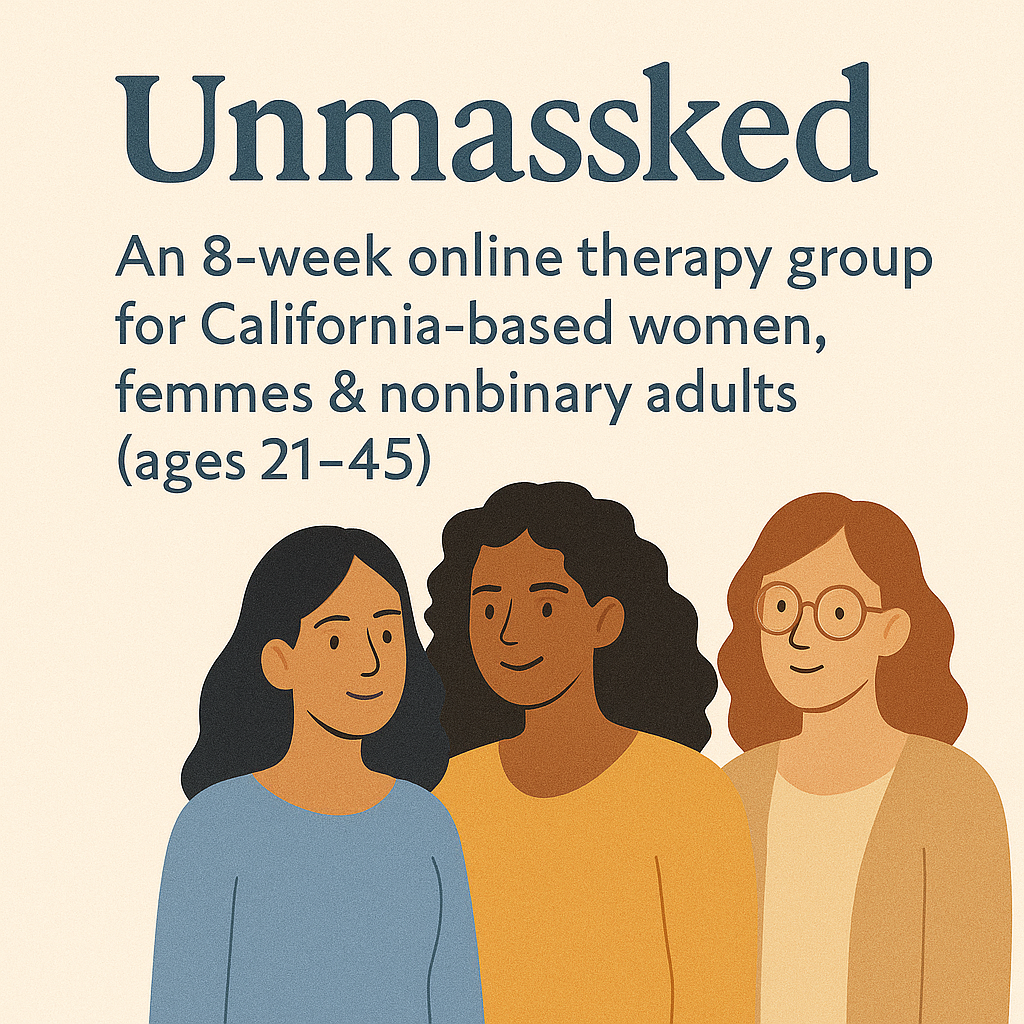Now open for Cohort
Unmasked?: AuDHD Therapy Group
Unmasked?: AuDHD Therapy Group is a virtual therapy space for women, femmes, and non-binary people socialized as women who are reclaiming their voice, rest, and self-trust.
A late-diagnosed/self-diagnosed AuDHDer’s in California are navigating AuDHD within systems that have misunderstood their sensitivity, creativity, and emotional depth.
This group is an invitation to breathe deeper, to understand the mask, and to explore the layered stories that shape identity. Rooted in a liberation-focused lens and neurodivergent-affirming care, this group welcomes you as you are. Together, we’ll tend to the roots of belonging and agency.
Why Join AuDHD Therapy Group?
Unmasked AuDHD Therapy Group gives you a place to land. A space to unravel, you’ve spent years trying to “hold it all together”, masking, perfecting, pushing through the overwhelm, only to wonder why it still felt so hard. For women and femmes diagnosed/self-diagnosed later in life, the journey to self-understanding can feel both validating and disorienting.
What You’ll Learn in Group Therapy:
Community Connection
Masking Compassion
Energy Awareness
Needs Advocacy
Value Alignment
Session Details for the AuDHD Therapy Group
Location: Online (Zoom) – accessible anywhere in California
Session Length: 50 minutes, Ongoing Process group
Frequency: Thursdays at 6:00 PM PST - Bi-Weekly
Commitment: Minimum of 4 sessions
Cost: $100 / month - $50 per session
Accessibility: Cameras are optional, chat participation is welcome, and sensory-friendly pacing is respected
Each AuDHD Therapy Group cohort is limited to 6 members to ensure depth, trust, and individual attention. Needs at least 4 to start.
Who Is the AuDHD Therapy Group For?
Unmasked: AuDHD Therapy Group is for California-based adults (ages 21–45) who identify as women, femmes, or nonbinary and who:
Have been diagnosed with ADHD or Autism as an adult or self-diagnosed, and still trying to make sense of what that means.
Struggle with emotional ups and downs, people-pleasing, or the pressure to always “keep it together”.
Finding yourself burnt out, stuck in cycles of executive dysfunction, or feeling like an impostor.
Longing for structured support that feels human, not clinical, or like you are put into a box of this or that.
FAQ About AuADHD Therapy Groups
-
Yes. AuDHD Therapy Group is open to those who suspect they may have Autisum + ADHD or who relate strongly to AuDHD experiences. A formal diagnosis is not required.
-
AuDHD Therapy Group is an ongoing, closed group—meaning once a cohort begins, new members are not added unless space becomes available (someone drops after 4 sessions). This helps build trust and safety over time.
-
No. AuDHD Therapy Group honors varying communication needs. You’re welcome to speak, listen, type in the chat, or simply observe until you feel comfortable.
-
As your therapist, I will guide each weekly 75-minute session alongside a trusted group of peers who also live with AuDHD. You can expect a structure that honors your story—from themes like identity and imposter syndrome to sensory or relational experiences. I’ve designed the space so that you can show up as you are, whether you speak aloud, journal quietly, or type in chat. You won’t have to fit into a rigid mold — you’ll be invited into connection, exploration, and being seen.
-
Absolutely not. When I facilitate, I emphasize that participation is as much about witnessing and receiving as it is about speaking. You might choose to listen, journal, fidget, or pace — all of which are welcomed and respected. If speaking feels right, you may share; if not, that’s perfectly okay. My goal is for you to feel safe, seen, and supported — not pressured.
-
From my clinical experience and supported by research, group therapy offers unique benefits: you’ll gain connection, I’ll provide therapeutic tools, and you’ll learn from others’ lived experiences. Studies show that group-based interventions for adults with AuDHD improve self-efficacy and understanding of AuDHD. While individual therapy remains a strong option (especially for very specific or complex layers), the group brings synergy — the shared journey, accountability, and community add a powerful layer of healing.
More About ADHD Support Groups





